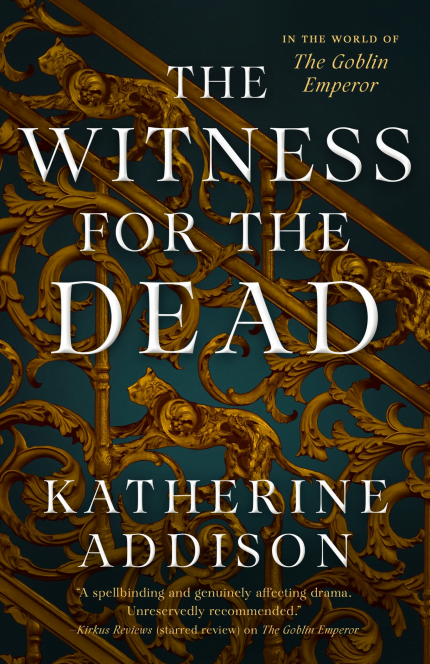The Witness for the Dead (The Goblin Emperor #2), by Katherine Addison

The Witness for the Dead by Katherine Addison
My rating: 3 of 5 stars
I very much liked “The Goblin Emperor”, the first book in this unusual series. Unfortunately, this successor fell clearly short of greatness.
The book’s eponymous “Witness for the dead”, Thara Celehar, is a humble, demure and thoroughly traumatized prelate who has – more or less – been exiled because he had an affair with a married man who proceeded to murder his wife.
Celehar is originally called upon to investigate the murder of an opera singer but large parts of the book are not actually about this investigation but about a forged will, a serial murderer who kills his newly-wed wives, a ghoul who needs banishing in the country side and a lot of other small “sub-plots”.
That’s where my issues with this book start: There is not one consistent primary storyline but there are several that are mostly unrelated to each other. Just like our thoroughly likeable hero Celehar, we’re following him in his exploits. The writing and world-building is so well executed that I, at times, felt like I was witnessing what happened. Everything felt plausible and intrinsically “real”.
Unfortunately, reality tends to be a lot about routine which isn’t very exciting. While I smiled at Celehar feeding stray cats, and I commiserated with him for his insomnia, his need to ration; it’s just not very interesting.
At times, especially when Celehar went to banish the ghoul, I wondered what narrative purpose this side story had – which turned out to be none.
At another time, Celehar is to undergo a “trial by ordeal” which amounted to spending the night on the “Hill of Werewolves”:
»The path, paved in ancient flagstones, meandered a good deal; I resisted the impulse to try to take a shortcut, even in places where it looked reasonable. I was halfway up the hill before I encountered the first ghost.«
Sounds great, doesn’t it? And it’s not just a single ghosts, it’s an entire battle between ghosts! And it culminates at the end of the page like this:
»Now all I had to do was to get through the rest of the night without going mad.«
I was drawing in my breath sharply, I felt my lungs expand, I held my breath; preparing to turn to the next page where I was shocked to read this:
»When I reached the gate at dawn, the canon was not the only one waiting for me.«
I immediately deflated.
There are lots of missed opportunities in this book that had – by its merits of good writing, a complex world, interesting characters and an author who knows how to capture her readers –
every chance of greatness but failed.
The murder of the opera singer? Solved pretty much by chance instead of using the setting of the opera house itself, its huge cast pretty much all of whom despised the victim.
The explosion of an airship, similar to the Hindenburg Disaster? In terms of the overall story just a side-note.
Or the shy beginnings of a romance between Celehar and the director of the opera, Pel-Thenhior: Of course, after the horrible ending of his previous relationship, Celehar is understandably reluctant to act upon his attraction to (and fledgling feelings for) Pel-Thenhior. The longer both interact, the more obvious it becomes that Pel-Thenhior, too, harbours more than just good will for Celehar but this remains a loose end like so many others.
Still, “The Witness for the Dead” is definitely not a bad book. It’s just one that, sadly, failed to realize its immense potential.
Three out of five stars.
View all my reviews